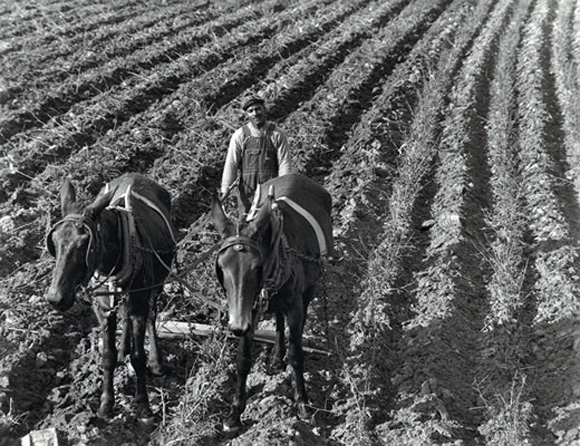
Black Farmer tending to the crops

Thomas Burrell speaks at a protest
Black Farmers Continue To Fight For Civil Rights
Black farmers have endured centuries long discrimination yet they continue to seek justice.
By Brian W. Carter
Sentinel Staff Writer
Farming is one of the main staples in human life and important to our society. Black farmers may not be a title a lot of people are familiar with but maybe we should be. Unfortunately, Black farmers have struggled to get the same rights as other farmers. Today, Black farmers, groups and associations are still fighting for their rights.
Black farmers have been unable to fully realize the American dream. They have been the victims of discrimination for centuries. The U.S. Department of Agriculture (USDA) has denied Black farmers loans and other government assistance.
As a result of the rampant discrimination, many groups have been formed over the years to represent the interest of Black farmers. The Black Farmers and Agriculturalist Association Inc. (BFAA, Inc.), being one of those groups fighting presently for restitution.
“The only difference between discrimination by a Black farmer and any other Black business person or citizen, is that you are dealing with discrimination incited by the highest level and that is the federal government,” said Thomas Burrell, President of the BFAA, Inc.
The BFAA, Inc. is 10,000 members strong, Black farmer rights organization based in Memphis, TN with state chapters in sixteen, mostly Southern states. Burrell is a vocal advocate for Black farmers and their rights.
Some groups would have the struggle originating on July 17, 1916, when the Federal Farm Loan Act became law. The act was established to assist farmers credit rates. The act made no provisions for farmers according to race, gender or class. This led to discrimination by the USDA towards Black farmers.
From 1910 to 2002, Blacks went from owning 15 million acres to 1,500,00 acres owned by 16,560 Black farmers. As Black farmers have passed away, without leaving any estate will or planning, the land was passed on to relatives. This led to further dissection of the land with it being owned by more than one relative. Over time, interests in the land decreases.
“Our ancestors owned more of this country on a per capita basis 150 years ago than we do today,” said Burrell in a 2005 interview with the Minnesota Spokesman Recorder.
Burrell grew up on a farm in the western part of Tennessee. He’s a graduate of the School of Business from the University of Michigan and a product of the Vietnam era. He returned home after school having realized that Black farmers weren’t receiving a fair shake as white farmers.
“I became one of the largest farmers in the area,” said Burrell, “At one time I was farming as many as 4,000 acres.”
Burrell was rallying attention to the plight of Black farmers as far back as the ’70s. He’s faced retaliation and lost capital due to his accusations but prevailed over them with perseverance.
The 1997 case of Pigford vs. Glickman, Black farmers joined a class action suit against the USDA. The National Black Farmers Association (NBFA) met with President Bill Clinton who testified before the United States House Committee on Agriculture.
U.S. Federal District Court Judge Paul L. Friedman approved and consented to the decree on April 14, 1999. The settlement recognized discrimination against 22,363 but excluded more than 70,000 other Black farmers. The settlement was known as the largest civil rights class action settlement in American history with over $2 billion.
Black farmers continued to protest due to not receiving the money from the settlement. Investigations were launched which led to the discovery that the USDA was holding back three quarters of the $2.3 billion. This led to another suit, Pigford II.
The case has been ongoing and has reached a focal point recently. The BFAA, Inc., NBFA and countless other groups have stayed on the USDA and their unfair treatments. Atty. Gen. Eric Holder and Agriculture Secretary Tom Vilsack have announced a $1.25 billion settlement of the ongoing lawsuit, Pigford II.
“We’re opposing this settlement,” said Burrell. “My organization is opposing this settlement.”
Burrell stated that this settlement leaves out 80% of claims made by Black farmers. He claims the amount is “not sufficient” to pay $50,000 to 80,000 farmers. Burrell says many will fall short of this new deal. “This new settlement ignores notifying folks who were not notified,” said Burrell.
He continued, “It is summarily, manifestly and actively for those only who knew about it and signed up, this is why we [BFAA, Inc.] oppose it.”
Black farmers have a long road ahead of them before they can rest in victory. Congress failed to appropriate the funds to Black farmers by March 31 when they went on a two week recess without addressing the issue. They have a choice to now drop out of the settlement and seek individual settlements or stay onboard.
“Our community, economically speaking, food and farming has always been the staple of our community,” said Burrell. “It is the mainstay of economic development for any community.”
Burrell and the BFAA, Inc. will continued to make sure Black farmers are heard and receive what they’ve been denied for so long. The Black farmer will continue to press on for his rights.
“The Black farmer is a survivor and the very fact that it’s taken now…not the Klu Klux Klan, not the skinheads, not some subversive, military group running through…the back woods of Idaho, Montana and Wyoming…but the Federal government…we’re still here,” said Burrell.






